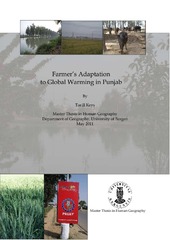Farmer’s Adaptation to Global Warming in Punjab
| dc.contributor.author | Keys, Torill | eng |
| dc.date.accessioned | 2012-02-14T13:50:06Z | |
| dc.date.available | 2012-02-14T13:50:06Z | |
| dc.date.issued | 2011-05-16 | eng |
| dc.identifier.uri | https://hdl.handle.net/1956/5612 | |
| dc.description.abstract | The global warming discourse has mainly focused on how to prevent global warming by trying to pin-point which countries should take most of the responsibility to stop or reduce the possible effects of global warming. We need to make sure that we not only continue to try to prevent further human impacts on the environmental system, but that we also focus on our ability to cope with the possible future impacts of global warming. To do this we will need to be flexible in order to be able to adapt to the situations that will ultimately arise and that will have to be dealt with. One major aspect of this is the issue of food security and the survival of farmers. But how will farmers respond to the future changes? This thesis is focused on farmers uncommited potential to adapt to change. | en_US |
| dc.language.iso | eng | eng |
| dc.publisher | The University of Bergen | eng |
| dc.subject | Punjab | |
| dc.subject | Ludhiana | |
| dc.subject | India | |
| dc.subject | Climate change | eng |
| dc.subject | Global warming | eng |
| dc.subject | The green revolution | eng |
| dc.subject | Traditional farming | eng |
| dc.subject | Farming | eng |
| dc.subject | Agriculture | eng |
| dc.subject | Himalaya | eng |
| dc.subject | Food security | eng |
| dc.subject | Water | eng |
| dc.subject | Adaptation | eng |
| dc.subject | Potential | eng |
| dc.subject | Constraint | eng |
| dc.title | Farmer’s Adaptation to Global Warming in Punjab | eng |
| dc.type | Master thesis | en_US |
| dc.rights.holder | Copyright the author. All rights reserved | en_US |
| dc.description.localcode | GEO350 | |
| dc.description.localcode | MASV-GEOG | |
| dc.subject.nus | 733111 | eng |
| dc.subject.nsi | VDP::Social science: 200::Human geography: 290 | eng |
| fs.subjectcode | GEO350 |
Files in this item
This item appears in the following Collection(s)
-
Department of Geography [627]
